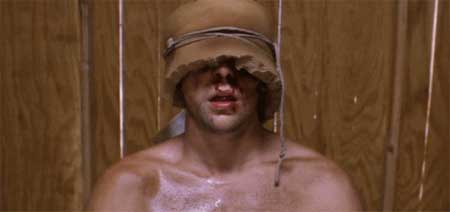I would find it difficult to draw up a top ten list of films of 2020 at this point. But Vanity Fair makes an attempt. I've only seen 2 (Da 5 Bloods, The Vast of Night) of these, and I have 3 on cue. I'm going to have to search to find the rest. In alphabetical order (where "the" doesn't count):
The Assistant
A film about the put-upon assistant to a raging, abusive (sexually and otherwise) movie producer, The Assistant was inevitably praised for its timeliness. The Assistant is an environmental movie, capturing the sights and sounds of a day at work, as Jane (the terrific Julia Garner) struggles to maintain both her dignity and her belief in the job at hand.
Bacurau
An isolated town in rural northern Brazil is stalked by something. Is it man-made? Extraterrestrial? Supernatural? Juliano Dornelles and Kleber Mendonça Filho’s film lets that mystery linger for a long while, lulling the audience into an eerie dream before disrupting it with brutal, violent fact. A movie about marginalized people fighting for their lives, Bacurau is a timely political tract—Mendonça Filho’s films have run afoul of the Brazilian government on several occasions, especially in the Bolsonaro era—and it’s also devilishly, startlingly entertaining.
Bad Education
Ostensibly concerned with an embezzlement scheme in a prosperous Long Island school district, Bad Education pushes its inquest, scene by scene, toward something profound. It’s a movie about want, the rapaciously American kind that lies at the heart of even the seemingly cleanest of people and institutions.
Da 5 Bloods
Spike Lee is back, quick on the heels of his Oscar-winning BlacKkKlansman, with an even better and more ambitious chronicle of black Americanness—this time by way of the Vietnam War. This is classic Spike: at times a hangout movie full of brash political talk, flashbacks, and wondrous digressions, at other times—especially in its second half—a painful, violent chronicle of the unfair, perilous hell that was Vietnam. Da 5 Bloods restores a sense of tragedy to history—all while reminding us of what that history still owes to Black Americans.
First Cow
Writer-director Kelly Reichardt’s fascination with the Pacific Northwest brings her, once again, into the past. The film is, yes, about a cow, said to be the first in the Oregon Territory . But it’s also about friendship, and food, and the small and lonely lives of so many people whose names have been lost to history in their helping to build it. First Cow is yet another example of Reichardt’s strikingly humanist touch; she makes films that teem with the texture and detail of little things in order to prod at something big.
Fourteen
Dan Sallitt’s small but mighty independent feature, which is streamable on the website of its distributor, Grasshopper Film, is an instant-classic tale of a difficult friendship. Tallie Medel and Norma Kuhling play a longtime pair of friends—the former responsible, caring, and consistent, the latter erratic, harsh, but undeniably brilliant—whose ties shift and erode over time as one woman’s mental health and subsequent social dependencies overwhelm her intimate relationships.
Never Rarely Sometimes Always
Eliza Hittman has once again given us a rare, startling chronicle of young adulthood—this time focused on a young woman, played by Sidney Flanigan, who’s pregnant and cannot stay that way. Her local clinic discourages her from pursuing an abortion, and even lies to her about just how pregnant she is—so, with her cousin (Talia Ryder), the 17-year-old Pennsylvanian travels to New York City, enduring all manner of bureaucratic speed bumps and inconveniences along the way, all while lugging a fat suitcase. (The movie’s title refers to the four answer options on one of the the clinic’s intake interviews—a conversation that winds up revealing surprising things about our pregnant heroine’s journey.)
Shirley
No staid literary biopic this. Though Shirley, directed by Josephine Decker, is about the famed author Shirley Jackson (most known, perhaps, for the grimly allegorical short story “The Lottery”), Decker takes a nontraditional tack in investigating the life and mind of the artist. Shirley whirls and yaws at a fevered, frenzied pitch, the film following Jackson’s furious mind as it haunts, terrorizes, and enlivens her Massachusetts home and those dwelling in it with her.
The Vast of Night
Andrew Patterson’s skillful, charismatic debut, which is streaming on Amazon Prime, is a sci-fi mystery whose mystery isn’t so obscure. The setting: a twilit night in 1950s New Mexico. The inciting incident: random power surges and a series of unrecognizable signals transmitted from who knows where. McCormick and Horowitz couldn’t be more fun to watch, more skilled at making the unknown feel genuinely unknown. But what really sells the idea are testimonies from two characters at the margins of the story (played by Bruce Davis, who never even appears onscreen, and Gail Cronauer, who terrifies us simply by talking)—testimonies that give the story such believable heft that even Dana Scully would take pause.
Vitalina Varela
“Vitalina,” the woman says. “My condolences. You arrived too late. You husband was buried three days ago. Here in Portugal there is nothing for you.” Portuguese auteur Pedro Costa’s newest film takes its title from its star, Vitalina Varela—a nonprofessional actress, consistent with the director’s ongoing experimentation with the blurred lines of fact, fiction, and performance—in a movie that takes after, but hardly neatly reproduces, incidents from her own life. Vitalina Varela is the best looking and most emotionally resilient movie of the year so far. Somber but (somehow!) electrifying, its frequent wordlessness, its consummate stillness, are a thrill.















